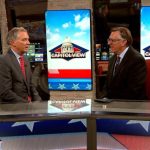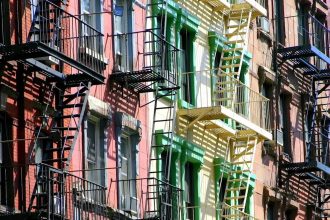The 1980 film Caddyshack — in which a teenage golf caddy gets sucked into a power struggle between the bluebloods who run the country club and rich but ill-mannered real estate developer Al Czervik, played by Rodney Dangerfield — is pretty much a metaphor for the last decade of American politics. Voters are the caddy. The rude developer who insults ladies and buys his way into the country club is Donald Trump, right down to the accent. And the judge, doctor and various other professionals scandalized by his antics are the leaders of the Democratic Party. Spoiler alert: The caddies side with Dangerfield’s character, even though they work for tips and he is the kind of guy who can just buy their place of employment. In their defense, it is pretty fun to watch him stick it to the snobs.
Caddyshack and its predecessor Animal House — in which a fraternity of drunken misfits feuds with the preppy frat and the dean of their college — helped establish a type of comedy now called “slobs vs. snobs.” This subgenre spans decades and includes The Bad News Bears (losing Little League team vs. winning team), Revenge of the Nerds (nerds vs. jocks), Trading Places (Black hustler vs. white yuppie), Stripes (enlisted men vs. military brass), Wayne’s World (outsider video artists vs. professional producers) and Dodgeball (independent misfits vs. corporate fitness chain). A lot of American comedies fit this rubric, so long as they pit low-status protagonists against institutional power in ways that expose the people in charge. That part is important: No slobs-vs.-snobs comedy has ever been made about wealthy and powerful heroes beating back an incursion of losers.
I mention this constraint of the form because I think it contains a political lesson for the Democratic Party, which keeps losing elections because its leaders are still urging voters to stop the slobs.
Zohran Mamdani, for example, has become the first mayoral candidate in memory to win the New York City Democratic primary but not the endorsement of his party’s leadership. Senate Minority Leader Chuck Schumer, House Minority Leader Hakeem Jeffries and Governor Kathy Hochul have all withheld their support, perhaps because they believe voters will prefer former governor/governor’s son Andrew Cuomo or current mayor/former federal defendant Eric Adams. In national politics, too, senior Democrats have repeatedly put their thumbs on the scale: In 2016, party leaders attempted to intervene to elevate Hillary Clinton to the nomination above Bernie Sanders, and the final 2024 nominee, Kamala Harris, was selected with no primary at all. In New York, senior Democrats’ decision regarding Mamdani may prove wise; their choices in 2016 and 2024 did not.
As elected Democrats and their consultants try to figure out where they went wrong in recent elections and how they might turn the party around in 2026 and 2028, they should ask themselves: If this were a movie, would we be the villains?
One reason slobs-vs.-snobs movies have proven so successful with American audiences is that they are about the restoration of meritocracy. In the first act, the slobs are kept down, unfairly, by the snobs’ hold on institutional power, even though the slobs are smarter, more inventive or just more likable. In the second act, the slobs try to stand up to the snobs, but their institutional power seems insurmountable. In the third act, though, the slobs redouble their effort/cleverness/alcohol consumption and expose the snobs as unfit for their positions. The social or institutional hierarchy is torn down, and the slobs become free to succeed on their own merits, without having to join the snobs or struggle vainly against their power.
This outcome was basically what Trump promised voters in 2016. Identical to
Caddyshack’s Dangerfield in his speech, demeanor and financial position if not actual class alignment, he joked and mugged his way to a series of victories over more experienced political opponents. Voters recognized that he was the slob, and his major rivals — first a president’s son, Jeb Bush, and then a president’s wife, Clinton — were the snobs.
That Trump was a boarding school graduate who inherited over $400 million did not seem to affect voters’ calculus, in the same way Danny the caddy doesn’t ask why he should risk his college scholarship to help a millionaire win a bet. In the narrative of the 2016 election, Trump was the slob, even though he was a textbook snob in both background and agenda. From cutting taxes for the wealthy to slashing regulations for corporate America, his policies reinforced the positions of those already in power, i.e. the snobs. But his rhetoric, demeanor and attitude toward the mythic Washington establishment has been pure slob.
One reason Trump has managed to remain the slob in American politics — despite his wealth, his hostility to actually marginalized people of all kinds and his now-total dominance of the Republican Party — is that Democratic leaders have consistently framed him as a threat to the system. On July 3, 2024, approximately three weeks before President Joe Biden withdrew his candidacy, the Biden-Harris campaign released a video framing Trump as a danger to democracy and the rule of law. I happen to believe this argument, but it is also what a snob would say. From the incumbent president, the argument that Trump endangered everything Americans hold dear sounded like Caddyshack’s Judge Smails warning that admitting Dangerfield’s Al Czervik would undermine the integrity of Bushwood Country Club, or stuck-up sorority sister Mandy Pepperidge complaining that John “Bluto” Blutarsky was a “P-I-G pig” in Animal House. The argument is not that the snobs are a superior alternative, but that the system preserving their position must be protected.
Any voter with access to a streaming video service will see through this argument immediately, because 50 years of entertainment have trained us to. While a supermajority of Americans continue to say that democracy is good, the word is flexible in both its connotations and its usage by various political figures, and voters know it. The candidate who says voting for her is the only way to save democracy is likely to be heard in roughly the same way as the CEO who warns that raising the minimum wage will lead to communism: as a beneficiary of one way of doing things who is defending that system and, by extension, her position at the top. The proof is in Trump’s 2-1 record in the last three presidential elections and Democrats’ total exclusion from power in Washington.
How much the slob/snob dichotomy has influenced recent races is, of course, a matter of conjecture. Who knows why American voters do anything? Some weigh the issues carefully, but I’m not sure enough do to swing an election. One 2004 paper by Princeton political scientists concluded that rainfall swung the 2000 election for George W. Bush. If you find a slobs-vs.-snobs theory of voter preferences farfetched, you have an opportunity to articulate the first convincing argument that Americans vote based on rational self-interest.
There are other factors, of course, and they are often more decisive than the slobs-vs.-snobs dynamic. The 2020 election, for example, was almost certainly a referendum on the Covid-19 pandemic, which voters were against. It would be absurd to conclude that Trump lost that year because he was the snob to Biden’s slob; Trump lost because the economy cratered and children stopped attending school. The slobs-vs.-snobs dynamic is one force in electoral politics, not the only force.
But it is a persistent pattern, and one that works to Democrats’ disadvantage. In order to change the dynamic that has cost them two out of the last three presidential elections, Democrats need to stop acting like the snobs at the end of the movie and become the slobs at the beginning. Then they can start the process of challenging Republicans’ institutional power. Maybe a second Trump administration and at least two years of total Republican control of Washington will be enough to shift voters’ sense of the parties, casting Democrats as the slob insurgents in 2026 and 2028. But that will only work if they change their rhetoric.
First, Democrats need to stop casting themselves as the defenders of institutions. The language of institutional power will always be the language of snobs. Rather than framing Trump as dangerous to systems that many voters already regard as stacked against them, Democrats should present him and other Republicans as the political arm of big business, inherited wealth and other structures of exclusionary power — because they are.
In order to advance this message, Democrats will need to talk about class. Since Bill Clinton, the party has run away from class issues, but those arguments are the ones that give the lie to Republicans’ claim that they are the slobs. For decades, Republicans have been the party of the rich, pursuing tax cuts and deregulation first and seeing to the cultural interests of their coalition partners second. Trump has continued that approach to governance, and none of his allies in Congress has meaningfully challenged it. Trump’s signature legislation lavishes tax cuts on the wealthy and cuts spending on Medicaid and food stamps; even his populist economic allies on the right have been disappointed. Democrats should call this class warfare what it is.
Some of these arguments and messaging strategies are likely to repel the snobs who are the Democratic Party’s biggest donors. That would not necessarily be a funding disaster. Mamdani and Sanders both built financially effective campaigns on small donors, but they did it by running on economic issues that appealed to voters at the expense of the large-donor class. Thus far, Democratic leaders have proven unwilling to do something similar.
In the third act of the slobs-vs.-snobs movie, the slobs always win, either through official competition (Caddyshack, Dodgeball) or by realizing they don’t care about the status symbols that matter to the snobs (Animal House, The Bad News Bears). In both cases, the slobs prove that they are better than the snobs, because the snobs’ privilege has made them soft. Such movies are based on the fundamentally American belief that poor kids, nerds, uggos and outcasts of all sorts are more likely to get it than people who are wealthy and popular.
Democrats’ biggest problem may be that they have forgotten this basic truth. Now that they are out of power, they have an opportunity to develop the kind of grit and inventiveness that slobs and all other types of underdog need to survive. First, though, they will have to remember that the moral of the slobs-vs.-snobs movie is actually true: The people who have to work for it are better than the people who have it handed to them. Until they embrace this idea and all its potentially uncomfortable implications, they will remain the snobs in the third act of American politics — wild-eyed and increasingly desperate, ordering voters to return to a system the slobs have already destroyed.









